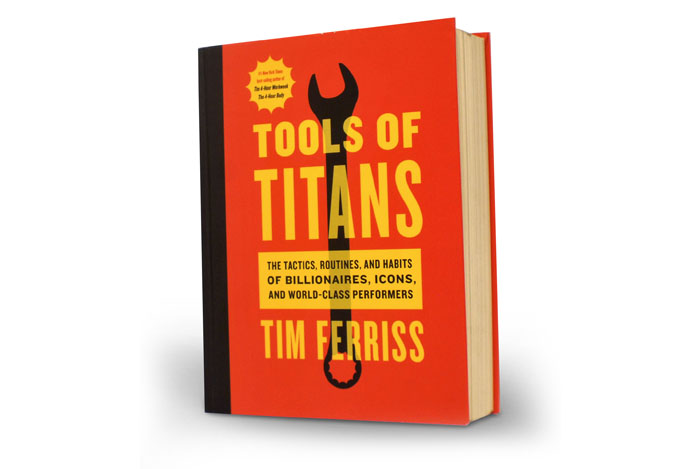
Tools of Titans by Tim Ferriss is a real doorstopper. As in, it’s so thick and heavy that it could hold a door- a big, heavy cathedral door. A huge book is a great thing when it’s filled with great ideas, right?
The subheading of the book is The Tactics, Routines, and Habits of Billionaires, Icons, and World-Class Performers. It’s organized in three sections- healthy, wealthy, and wise and each chapter features someone the author has interviewed for his popular podcast The Tim Ferriss Show.
In the introduction of the book, Ferriss said he wanted to convey two principles in Tools of Titans:
- Success, however you define it, is achievable if you collect the right field-tested beliefs and habits.
- The superheroes you have in your mind are nearly all walking flaws who’ve maximized 1 or 2 strengths.
That’s the jaw-dropping simplicity of this gorgeously gargantuan book. The author goes on to give the reader permission to “borrow liberally, combine uniquely, and create your own bespoke blueprint.”
Tools of Titans should be read slowly and savored. Ferriss is a master interviewer, diving into deep rabbit holes of intellectualism, then capriciously asking “What’s your spirit animal?” and “Who comes to mind when I say the word ‘punchable?’ ” Below are the thoughts I underlined in my copy of the book.
Favorite Thoughts from Tools of Titans
Make time for learning. Noah Kagan doesn’t just try to find time for learning. He schedules it every Tuesday morning from 10am- 12pm.
Journal to clear your mind and get on with your day. Tim Ferriss’ morning journaling concept is inspired by author Julia Cameron. She said writing morning pages are “spiritual windshield wipers” and “once we get those muddy, maddening, confusing thoughts [nebulous worries, jitters, and preoccupations] on the page, we face our day with clearer eyes.” Ferriss’ journal entries (no matter how scattered) accomplish two things: 1. Figuring things out. 2. Caging his monkey mind. On the second point, Ferriss said, “Morning pages don’t need to solve your problems. They simply need to get them out of your head, where they’ll otherwise bounce around all day like a bullet ricocheting inside your skull.”
Listen to audiobooks as brainfood. Seth Godin’s favorite audiobooks, which he listens to repeatedly, are:
- Goals: Setting & Achieving Them on Schedule, How to Stay Motivated, and Secrets of Closing the Sale by Zig Ziglar
- The Art of Possibility by Rosamund Stone Zander and Benjamin Zander
- The War of Art by Steven Pressfield
Minimize decisions. Scott Adams (creator of Family Guy) has the exact same breakfast every morning: a chocolate-peanut butter Clif Builder’s protein bar. Seth Godin has the same smoothie every morning: frozen banana, hemp powder, almond milk, a dried plum, and walnuts. Both gentlemen said they create routines to conserve brain space for more important things, thereby avoiding decision fatigue.
Execution is everything. When asked what message he’d put on a billboard, Scott Belsky’s response was this: “It’s not about ideas, it’s about making ideas happen.” Everyone has ideas. What will make you stand out is moving forward on those ideas.
Hunt antelope, not field mice. Ferriss quoted authors James Carville and Paul Begala’s description of Newt Gingrich in their book Buck Up, Suck Up… and Come Back When You Foul Up: 12 Winning Secrets from the War Room.
Newt uses a brilliant illustration to explain the need to focus on the big things and let the little stuff slide: the analogy of the field mice and the antelope. A lion is fully capable of capturing, killing, and eating a field mouse. But it turns out that the energy required to do so exceeds the caloric content of the mouse itself. So a lion that spent its day hunting and eating field mice would slowly starve to death.

So, now what? Read this book. Do as the author says and “borrow liberally, combine uniquely, and create your own bespoke blueprint.” I know I will.


